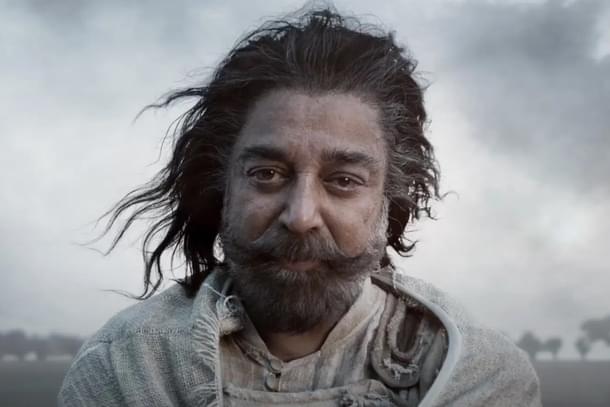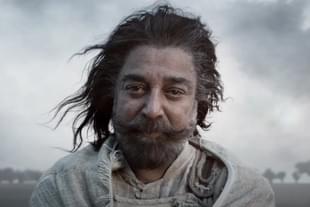Culture
TED Talk Wrapped In A Soliloquy: How Kamal Haasan Became A Parody Of Kamal Haasan
K Balakumar
May 27, 2025, 07:30 AM | Updated 12:13 PM IST
Save & read from anywhere!
Bookmark stories for easy access on any device or the Swarajya app.


There was a time, not so long ago, when Kamal Haasan's interviews were events in themselves. They were intellectual sparring matches, insightful treatises, and impromptu masterclasses in cinema, history, literature, and life.
The Ulaganayagan, the Universal Hero, would hold court, his abstract words a rich tapestry woven with erudition, self-deprecating wit, and a passionate, almost evangelical zeal for the cinematic art form. He was the perpetual student and the eternal teacher, an artist who devoured knowledge and then, with characteristic generosity, sought to share it with the world.
But something has shifted.
The intellectual glint in his eye, while still present, is now clouded by a weariness that feels less like seasoned wisdom and more like sheer exhaustion. In the recursive corridors of his long and winding career, the actor has ceased being a performer and provocateur.
He has become a spectacle unto himself — an echo chamber reverberating with philosophical flourishes, theatrical affectation, and cryptic wisdom wrapped in semantic origami.
What once felt daring now feels like déjà vu. What once challenged the audience now dares them to keep up with his endlessly inward gaze.
The man who built his career on shattering cinematic conventions — playing dwarves, aging backwards, swapping genders, speaking ten dialects — now resorts to banal mystification. The content is light; the delivery, dense.
His speech patterns have become baroque: long-winded tangents laced with anecdote, humility cloaked in grandeur, and an ever-present need to remind us of his philosophical rigour. He frequently references his past works, his collaborations, and his philosophies — often in ways that feel more like self-congratulatory musings than genuine reflections.
It’s as if the actor Kamal has been gradually overwritten by the idea of Kamal.
Each promotional interview seems like a performance of a performance. And not content with being a legend, he insists on being the narrator of his own legend — again and again and again.
Promotions or The Art of Overstatement?
In the ongoing Thug Life promotional circus, Kamal has begun to resemble an Inception-like enigma: a dream within a dream, a parody within a parody, walking backwards into mirrors that reflect not his present, but a glorified catalogue of his own past performances.
It is less an act of self-expression now, and more a loop of self-reference — prolix, ponderous, and paradoxically empty despite its layered density.
Thug Life, a reunion with Mani Ratnam after a momentous 37 years, promised a renaissance. The coming together of two titans — the creator of Nayakan and its unforgettable protagonist — was cause for celebration.
Yet, the celebratory buzz has been diluted by Kamal's interviews in which his answers are seldom direct or to the point. Sometimes they are not even answers to the question but just random spiels in search of some other assumed adjacent query.
The questions — which, admittedly, are silly and surface-level — are often met with ponderous detours and anecdotes that have seen repeated airings. Even while being true, they have lost their novelty through sheer reiteration.
When asked about the pressures of reuniting with Mani Ratnam after Nayakan, one might have expected a reflection on growth, creative synergy, or the nuanced differences in their artistic approaches.
Instead, Kamal resorted to a broader, vague discourse on evolution.
"He is not the same Mani Ratnam, and I'm not the same Kamal Haasan anymore," he stated, adding,"I'm an experienced actor now. Even AR Rahman is not the same person who made Roja (1992). We have all evolved over the years. It would be wrong if we remained the same. I look upon our evolution as a matter of pride. I'm glad we are not the same people anymore."
While this sentiment is undeniable, its delivery precludes any direct, specific inquiry into the present collaboration. The laborious cadence, the almost didactic tone, suggests a man playing a role he has donned too many times.
The Counterproductive Complexity
His observations on the role of technology and AI in filmmaking, while intellectually sound, similarly fall into a predictable pattern.
There's a curious paradox at play. Kamal, the man who famously embraced every genre and pushed every boundary, now seems caught in the clichés of his own creation.
For a man who once prided himself on storytelling that had instant connect with the public, he now speaks in abstractions so thick that they serve neither art nor intellect. His words orbit meaning, rarely landing.
“I’m not a guru,” he said at another event. “Just remember me, that’s enough.”
This line, deceptively modest, captures the self-looping conundrum of Kamal today. It’s a plea for immortality disguised as humility.
Even the humour, once sharp and insightful, misfires or feels forced.
An incident during the Thug Life promotion, involving a joke about co-star Trisha and bananas, sparked online debate, with some deeming it inappropriate. While many defended him, asserting it was lighthearted banter, the fact that he went with that line clearly showed that he is not reading the room — and the connotations that the modern-day vocabulary carries.
Kamal's brilliance is undeniable. His contributions to Indian cinema are monumental.
But in the current promotional climate, his verbose ways are counterproductive. They risk alienating the audiences. They overshadow the film itself, becoming the primary topic of discussion — and also a stick to beat the film with after its release. (Cue for Indian 2 fiasco.)
Every interview seems a TED Talk wrapped in a soliloquy. Every one of them feels like a desperate attempt to remind the world that Kamal still burns, even if the heat has been replaced by haze.
His tendency to frame every project as a grand artistic evolution, and to intellectualise even the most straightforward aspects of filmmaking, instead of generating excitement, just feels like academic lectures — ones that demand patience rather than enthusiasm.
The Man as a Meme
Thug Life's promotional cycle underlines the fact that sometimes, less is more. Kamal’s words, once his greatest strength, now risk becoming his greatest burden.
There is a kind of tragicomedy to this transformation. He once insisted that the audience should not treat cinema as religion. And yet he performs like a high priest at the altar of his own filmography.
He’s trying to be the myth and the mythologist, the prophet and the scripture, the flame and the sermon.
Kamal, make no mistake about it, is an institution. But like all institutions, he faces the danger of ossification. Today, he risks being remembered not as the ever-evolving chameleon, but as the ouroboros — forever consuming his own tail, feeding on the myth of himself.
Thug Life may yet surprise us. Maybe Mani Ratnam will cut through the fog and come up with a film that silences this recursive noise. But unless that happens, Kamal will continue looping within the intricacies of his own invention.
A man so meta that he has ceased to exist outside his own metaphor — whatever that means.





